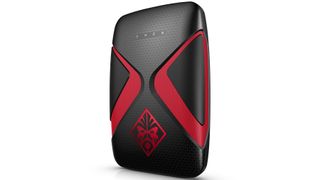HP and MSI's backpacks put a new spin on VR
A good omen for VR?

HP and MSI have both revealed new backpack PCs which are designed for virtual reality gaming on the likes of the HTC Vive or Oculus Rift.
The idea is to cram a desktop computer powerful enough for VR into a backpack which you can simply wear while gaming, thus avoiding having to trail cables from the VR headset across the room to a PC, which is inconvenient and a potential tripping hazard to boot.
HP's Omen X follows hot on the heels of the release of overhauled Omen gaming laptops (and a desktop PC), and it stuffs notebook components into a rather nifty looking and compact black and red backpack weighing under 4.5kg (10 pounds).
Naturally, the components will be powerful enough to drive VR gaming (otherwise there wouldn't be much point), although exactly what will be included hasn't been confirmed yet, and the backpack is currently still in the prototype stage.
If you're wondering about power, HP's backpack boasts a battery which keeps the machine running for an hour, plus it has two extra batteries you can hot-swap in for longer gaming sessions (with a small additional juice pack to keep the PC going as the batteries are swapped over).
In an interview with techradar, HP's Vice President of Customer Experience and Portfolio Strategy explained the goal was to create a wearable VR-ready PC that eliminated the chance of tripping over a cord. According to its research, the company found users were willing to wear the backpack over dealing with a tether line running down the back of their neck.
Packing a punch
MSI's backpack PC is an unsurprisingly similar affair, driven by a Core i7 CPU twinned with an Nvidia GeForce GTX 980 graphics card, but this aside there are little details about the device at this stage. We'll hear more soon enough, doubtless, and we'd expect more companies will jump on board the portable VR PC bandwagon.
Get daily insight, inspiration and deals in your inbox
Get the hottest deals available in your inbox plus news, reviews, opinion, analysis and more from the TechRadar team.
These backpack PCs are certainly an interesting concept, because the trailing cable from the VR headset is far from ideal. However, you're inevitably making other compromises, such as the comfort level of having to carry a weight on your back, and the inevitable limitations of a machine not plugged into the mains. Not to mention the relative cost compared to a traditional PC, no doubt.
Still, we shouldn't judge until we've tried them, and it will definitely be interesting to give these inventions a run out when they're available.
Image Credit and Via: Tom's Guide
- Also check out: How to build the ultimate PC for virtual reality
Darren is a freelancer writing news and features for TechRadar (and occasionally T3) across a broad range of computing topics including CPUs, GPUs, various other hardware, VPNs, antivirus and more. He has written about tech for the best part of three decades, and writes books in his spare time (his debut novel - 'I Know What You Did Last Supper' - was published by Hachette UK in 2013).
Most Popular


